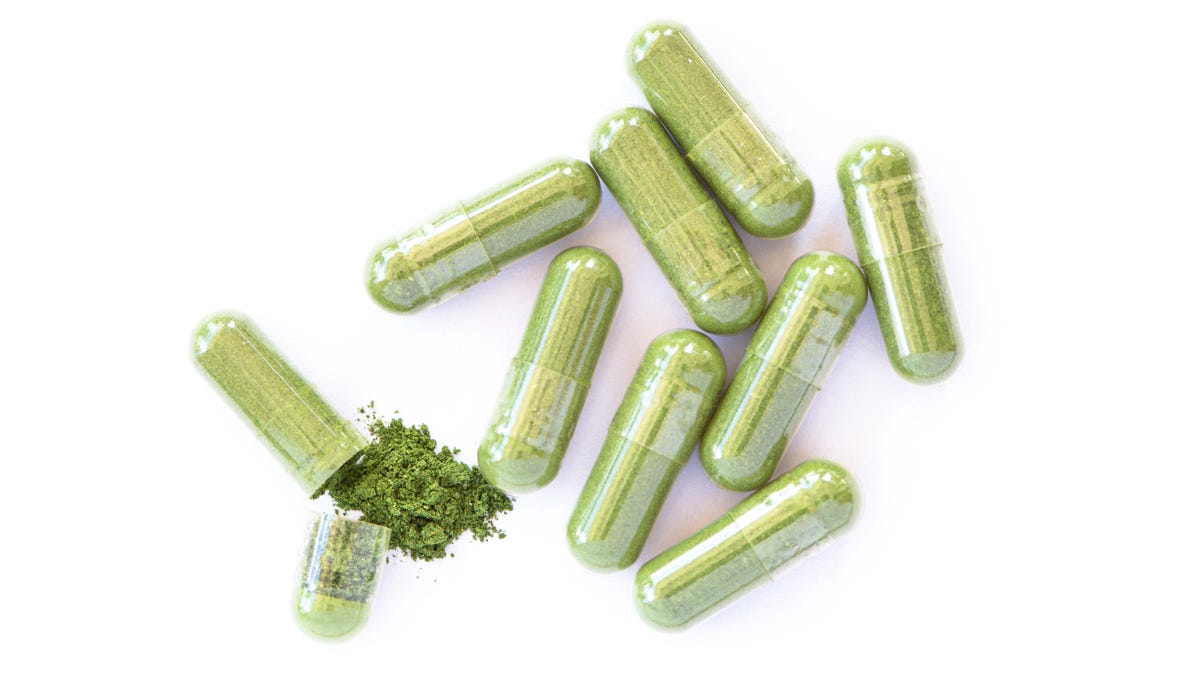If you follow health and wellness trends, odds are you’ve heard of spirulina. Known as a type of superfood, this algae has a high concentration of antioxidants and nutrients. It also has the potential to support your immune system, eye health and healthy cholesterol while lowering blood pressure. However, research on spirulina is ongoing and there are some risks you should keep in mind.
To help you learn more, we put together this guide on spirulina’s pros, cons and dosages.
Benefits of spirulina
Spirulina is a type of blue-green algae, considered one of Earth’s oldest life forms. It is a cyanobacteria that uses photosynthesis to create energy, similar to a plant. Because of its natural nutritional content, it has been called a superfood for humans, but how does it actually affect human health?
These are some of the known health benefits of spirulina.
It’s full of nutrients and antioxidants
Spirulina has many different nutrients that the body needs to stay healthy, including vitamins such as thiamin for healthy metabolism and vitamin A for vision, as well as minerals such as copper and iron that help improve immunity. There are also other nutrients, like omega-6 and omega-3 fatty acids that fight inflammation, and antioxidants like phycocyanin and beta carotene that help reduce the risk of certain diseases. With 60% protein content, spirulina provides more protein than many vegetables and is a popular protein source for vegans and vegetarians.
According to the US Department of Agriculture, one teaspoon of dried spirulina contains 20 calories and the following nutrients:
|
Dried Spirulina (1 tsp) |
|
|
Vitamin |
Amount |
|
Protein |
4 grams |
|
Calcium |
8.4 milligrams |
|
Thiamin |
14% of the Daily Value (DV) |
|
Riboflavin |
20% of the Daily Value (DV) |
|
Niacin |
6% of the Daily Value (DV) |
|
Copper |
47% of the Daily Value (DV) |
|
Iron |
11% of the Daily Value (DV) |
Spirulina also contains magnesium, potassium and manganese in small amounts.
All of these vitamins and nutrients can help you meet your daily nutrition requirements.
It can support healthy cholesterol
Spirulina has been found to lower “bad” and total cholesterol and triglycerides, while increasing the good cholesterol, high-density lipoprotein (HDL). This prevents the fat and cholesterol in your blood from clogging your arteries, which, in turn, can put strain on your heart. One small study found that those who took 1 gram of spirulina daily had lower cholesterol after just three months.
Maintaining healthy cholesterol levels helps prevent heart disease, as well as heart attack and stroke, per Harvard Health.
It could help your immune system
Spirulina contains vitamins and minerals that are important for immune health. Additionally, research has found that it increases the production of white blood cells and antibodies, both of which the body uses to fight illness. Importantly, spirulina’s effects on the immune system make it risky for those with autoimmune diseases like lupus, per WebMD.
Spirulina’s anti-inflammatory properties may also benefit people with allergies from common culprits, including dust, pollen and pet hair. It has been explored as an alternative treatment for allergic rhinitis symptoms, although more research is needed.
It may lower blood pressure
Spirulina can increase the production of nitric oxide, which relaxes the blood vessels and helps them dilate. Multiple studies have found that a daily dose of spirulina can help reduce both systolic and diastolic blood pressure (the first and second numbers on a blood pressure reading). It has also shown positive effects for those who have hypertension.
It can support eye health
Spirulina can benefit eye health as well. It is rich in beta-carotene, an antioxidant that the body converts into vitamin A. Vitamin A has been shown to help prevent vision loss and promote better eye health, per the American Academy of Ophthalmology.
According to the Icahn School of Medicine at Mt. Sinai, spirulina also contains a high concentration of zeaxantuin, which can reduce the likelihood of cataracts and age-related macular degeneration. Some animal research has supported spirulina’s eye health benefits, but more research is needed for greater insights into how it could benefit humans.
Risks and downsides of spirulina
When discussing any superfood, it is important not to focus solely on the hype and ignore potential risks. Here’s what to keep in mind with spirulina.
Lack of research
Spirulina has been around for a long time, but scientists are still learning more about its effects on the human body. Many of its purported health benefits are based on animal research or limited studies.
For example, one theory is that spirulina could help prevent cancer. It’s rich in antioxidants that are known to fight inflammation, which can cause cancer. For example, it contains phycocyanin, which has been found to reduce inflammation while preventing the growth of cancer cells. However, studies continue to examine the exact correlation, if any, between spirulina and cancer.
Researchers are also studying spirulina and the possible prevention and treatment of the flu, herpes and HIV, but again, more studies need to be done.
It’s not regulated
Many spirulina products exist on the market today, but exercise caution when purchasing.
As with all supplements, spirulina is not regulated by the Food and Drug Administration. Some spirulina products have been found to contain contaminants, especially if they were harvested in wild areas rife with heavy metals. These contaminants can damage your liver with enough exposure.
Additionally, some products may contain more or less spirulina than what’s listed on the label.
Side effects and safety precautions
Spirulina is largely considered safe at regular doses, and the Dietary Supplements Information Expert Committee gives it a Class A safety rating. However, some potential side effects include difficulty sleeping, digestion problems, and symptoms including nausea, vomiting, headaches and dizziness. Some people have reported allergic reactions.
Spirulina is not recommended for people on certain medications, such as those designed to lower blood pressure, cholesterol or immune system activity. Additionally, it is not recommended for the following groups of people:
- Pregnant women
- Children
- Those with autoimmune diseases
- Those who are about to have or have just had surgery
Before using spirulina, always check with your doctor about any possible drug interactions, and buy it from a reputable retailer to ensure its legitimacy and safety.
How to take spirulina
One of the perks of spirulina is its versatility. Sold at most health food stores, it is available as a tablet, capsule or powder supplement. It has a bitter flavor, but mixing it into yogurt or a smoothie can hide that.
Dosages may vary. Before you take spirulina, ask your doctor how often you should use it and how much you should take. You can also bring it to your appointment so your doctor can double-check the brand and confirm that it is safe for you to use.
Spirulina can be a useful addition to your health regimen, but research is continuing to determine how it affects the human body. Pay attention to the newest studies and buy vetted products from reputable brands. Spirulina is not ideal for everyone, but your doctor can help steer you in the right direction.







